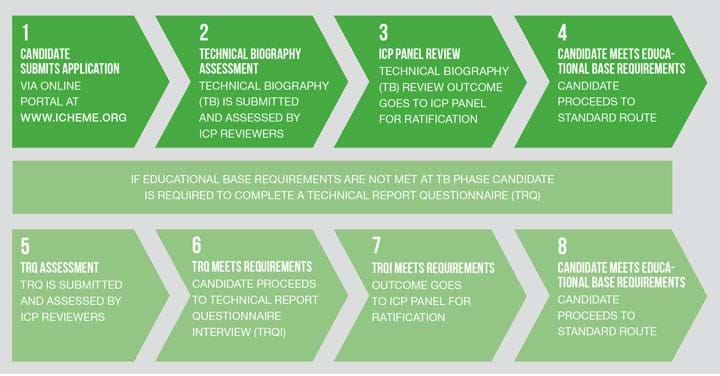Individual Case Procedure
Rob Best explains how volunteers are developing a better filter for membership applications
ICHEME is undertaking a series of projects that aim to improve member services, service delivery and the sustainability of IChemE.
One of these is an overarching project called Programme SMART which, as IChemE’s Vice President of Qualifications Ainslie Just discussed in the last issue, aims to deliver sustainable membership growth (p54, issue 945).
This issue, I’m going to provide an update on one of the projects in the “Flexible Pathways to Membership” area of Programme SMART.
Flexible Pathways is focussed on Stage 1 of the application process which deals with the educational base for IChemE membership. At Stage 1, applicants with a full set of accredited qualifications are exempt from further qualification requirements and are able to proceed immediately to Stage 2 (Initial Professional Development). Those without are required to undergo an individual assessment, wherein lies the difficulty, as they find the existing process for assessing their case confusing and excessively demanding. To address this, we have developed a new Individual Case Procedure (ICP) which we plan to launch later this year.
Early in the development of the new process, in 2017, IChemE reviewed its existing assessment of non-accredited qualifications and how this compared with other professional engineering institutions. We also spoke to potential members, and to members who have been through the process, to learn about their concerns.
The feedback we received from individuals and companies made it clear that there was a great deal of frustration among those without accredited degrees. For example, some had good degrees in chemical engineering (though not accredited by IChemE) and, despite practising as chemical engineers for many years, found the hurdles to membership of their professional body far too daunting, so didn’t apply.
On the other hand, to date we routinely ask anyone without a full set of accredited qualifications to produce a 5,000-word Technical Report, regardless of whether they have a chemical engineering qualification or not. To use an engineering analogy, the filter we’re using is not selective enough. For Chartered Membership, we require either an accredited MEng or a combination of an accredited BEng(Hons) with an accredited MSc: people with either of these are exempt from the current Technical Report. It seems very unfair then that as things stand, a person with an accredited BEng(Hons) chemical engineering and no MSc but with 20 years of experience designing process plants must follow exactly the same route as a newly-qualified chemistry graduate and submit a 5,000-word Technical Report. It is perverse that we give no recognition for a good and appropriate qualification.
We found a significant number of people practising chemical engineering but with degrees in other subjects...had similar issues with providing evidence that their knowledge and understanding meet our requirements
Furthermore, we found a significant number of people practising chemical engineering but with degrees in other subjects, such as chemistry, other engineering disciplines, and mathematics, who had similar issues with providing evidence that their knowledge and understanding meet our requirements.
To remedy this, our new process will provide a more flexible and transparent process which will review and assess knowledge and understanding at an individual level. Above all, the process is designed to ensure that IChemE applies consistent standards for membership by assessing individuals against the same standards of achievement as those used for accrediting degree programmes.

New process
A task group with representatives from the Professional Formation Forum (PFF) and the Education and Accreditation Forum (EAF) has developed a two-phase approach to ICP based on the Learning Outcomes IChemE uses to assess university qualifications for accreditation (see Figure 1). The process has been tested and refined by three pilot studies involving 42 candidates.
So, how does it work?
The starting point is for all candidates who apply through the new ICP process to be in IChemE membership at the appropriate grade (Associate or Affiliate Member) before they apply, and they must remain in membership throughout the process.
We are recruiting volunteer ICP reviewers to peer review all ICP applications. ICP reviewers will be Chartered or Fellow members of IChemE and will receive training so that we maintain standards and ensure consistency. We have established a new Individual Case Procedure Panel to oversee the process, and Fenella Nordquist FIChemE, IChemE academic programme assessor for 25 years, has been appointed as its first Chair. The ICP Panel will comprise a representative group of reviewers and will report to the EAF.
Recent Editions
Catch up on the latest news, views and jobs from The Chemical Engineer. Below are the four latest issues. View a wider selection of the archive from within the Magazine section of this site.




